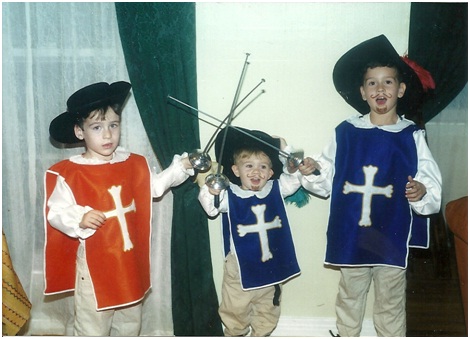You can always tell who is the youngest of three boys because of the confidence and passion that comes with being the third son. You are paved a path by your brothers, and in addition, you take on the reputation, good and bad, that they left you.
Charles Wensinger ’14, the third son in his family, stated, “An advantage of being the third son is learning from the mistakes and mishaps of your older brothers. In my family I am considered the ‘baby’ which I love because I always get the attention.” With the loving moms that we all have, the youngest are always the “babies” and they will never outgrow that reputation.

The class of 2016 has a significant amount of third sons and they are always identifiable. Being the third son gives you recognition from older kids that are friends of your brothers. Benjamin Dossett’16 puts being the youngest son as, “Nothing beats the feeling I get when older kids identify me as Jack’s brother or Gus’.”
Dossett also stated, “My brother tells me that the third and youngest son is identifiable by their distinguished sense of humor.” The third son always has a great sense of humor starting at a young age. They tend to pick up on jokes at a younger age and develop an intelligent and witty sense of humor.
All boys have a certain creativity to them, but the youngest of brothers by far have the best. An aol.com poll shows that the youngest tends to be the most creative and charming. The poll also shows that the youngest are the best speakers and writers, often gaining such knowledge at a young age.
A psychologist Walter Toman developed the Bowen theory which shows that all children from the same age group often have a similar trait among them. In one of his studies he finds that oldest children tend to gravitate to leadership positions and youngest children often prefer to be followers. The characteristics of one position are not “better” than those of another position, but are complementary.
The Bowen theory also states that a boss, who is an oldest child, may work unusually well with a first assistant, who is a youngest child. Youngest children may like to be in charge, but their leadership style typically differs from an older sibling’s style. The research in the theory also shows that the youngest are more willing to jump into leadership roles and they often do not have fear of expectations.
The youngest sons tend to hangout together because of the confidence exhibited in the youngest children. Statistics and studies show that the youngest often have good friendships with each other. Rather than being comfortable with responsibility and leadership, an oldest child, who is anxiously scrutinized, may grow up to be markedly indecisive and highly reactive to expectations. However, a youngest child, who is also anxiously scrutinized, may become an unusually helpless and demanding person, but they may develop more characteristics of an oldest child than his older brother. The youngest children often become demanding because of the example of their older siblings.
Mrs. Julie Carver, junior physics teacher and mother of three sons, describes her youngest son as, “Definitely the most outgoing. Due to having brothers, he matured very quickly.” Mrs. Carver went on to say, “He developed a more relaxed, patient outlook on life since he had to wait for most everything.”

The characteristics of being the third son can apply to the third daughter as well. Mr. Jude Harrington, junior theology teacher and father of three daughters, states, “One of the differences I have seen is that she has been really quick to play with the other two in interactive play.” Although his youngest daughter is only one year old, he has seen a different willingness in her than his two older daughters had at that time. Harrington went on to say, “She will intentionally crawl on top of the older daughters and follow them around the house looking to play with them. The youngest also loves to get into more things than the older two and is much more mischievous.”
Dean Sayers ’16 says, “I have the ability to convince my mom to let me spend the night out two nights in a row which is what my brothers were never able to do. I may be smaller than they are, but I have always had the upper-hand in the salesmanship category.”

Lucy Dossett, a mother of four boys, claims that Ben, a freshman at Jesuit, is the most confident and spiritual. “Ben without a doubt shows the most love and happiness in the house. He tends to be more spiritual and has a very happy outlook on life.”
The third son position, however, has a few disadvantages to it. They often miss out on activities, because they were not enjoyed by their brothers. Boy Scouts, for example, were not enjoyed by some siblings and it was an experience most of younger siblings missed out on. Ben Dossett stated, “Due to the inability of my brothers to wear their retainers, I missed out on braces because I was told my teeth would end up crooked and braces just ended up a lost cause.” Wensinger added, “You are smaller and weaker so you find yourself getting picked on and beaten around.” Another disadvantage to being the third and youngest son are the hand-me-downs we get.
Being the third son has its ups and downs and there is no one more prepared to take on the world than they are. They have been given all the advantages and the disadvantages that come with the position. Though the situation may vary from sibling to sibling, one thing remains true for most third sons, they would not trade it for anything.






